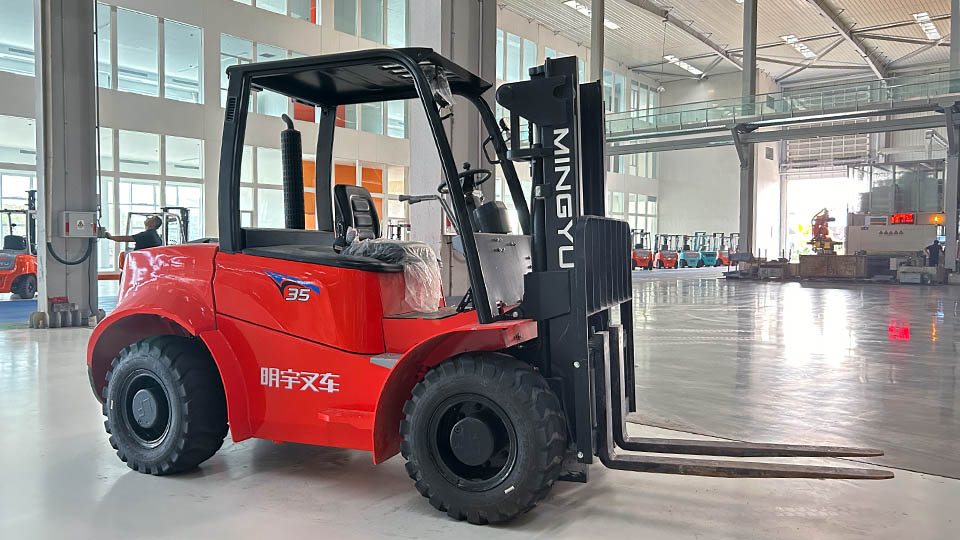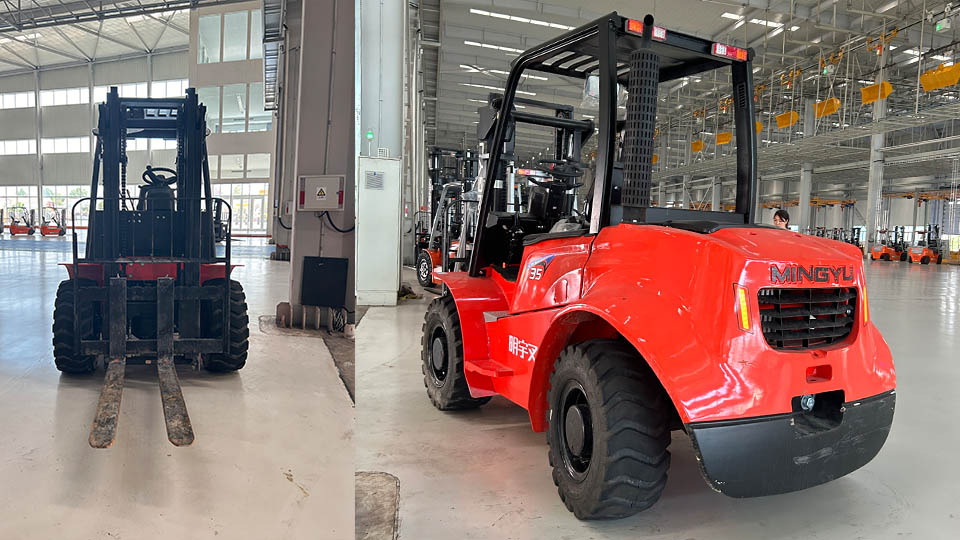
How Much Do Rough Terrain Forklift Operators Make? A Comprehensive Guide
Operating a rough terrain forklift is a specialized skill that demands precision, awareness, and a deep understanding of heavy machinery. Unlike their indoor counterparts, these robust machines navigate challenging environments – from muddy construction sites and uneven logging trails to vast agricultural fields. This unique set of demands directly influences the earning potential of rough terrain forklift operators, setting their salaries apart from general forklift operators.
This comprehensive article delves into the various factors that determine how much a rough terrain forklift operator can expect to earn, explores the job outlook for this critical role, and outlines the training and certification necessary to enter and advance in this rewarding field.
The Role of a Rough Terrain Forklift Operator
A rough terrain forklift operator is a highly skilled professional responsible for moving, lifting, and placing heavy materials in outdoor, often unpaved, environments. Their work is crucial in industries such as:
Construction: Transporting lumber, steel beams, concrete blocks, and other building materials across uneven ground and job sites.
Logging and Forestry: Moving logs and other timber products in forests and lumberyards, often on steep and slippery terrain.
Agriculture: Handling large bales of hay, feed, and other farm supplies on fields and unpaved farm roads.
Mining and Quarrying: Shifting raw materials and equipment in challenging, often dusty or rocky, conditions.
Event Management: Setting up and dismantling large-scale outdoor events, including moving stages, tents, and heavy equipment.
The specialized nature of these tasks means operators must possess exceptional judgment, an understanding of load stability on inclines, and the ability to maneuver complex machinery in variable weather conditions.
Salary Overview: What to Expect
The salary of a rough terrain forklift operator is influenced by a confluence of factors, making a single, definitive figure elusive. However, we can establish a general range and explore the variables that cause these fluctuations.

As of May 2025, general forklift operator salaries in the United States average around $17.84 per hour, or approximately $37,097 annually. However, it's important to note that rough terrain forklift operators, due to their specialized skills and the demanding nature of their work, often command higher wages.
Some data suggests that operating specialized forklifts like rough terrain models can lead to salaries ranging from $26,000 to $38,000 annually, and even higher in some cases. More broadly, Construction Equipment Operators, a category that often includes rough terrain forklift operators, had a median annual wage of $58,320 in May 2024, with the lowest 10% earning less than $39,850 and the highest 10% earning over $99,930. This broader category indicates the significant earning potential for skilled operators of heavy construction machinery, including rough terrain forklifts.
Key Salary Determinants:
Experience Level:
Entry-Level: Operators with minimal experience (0-2 years) will typically start at the lower end of the pay scale. They may begin with basic tasks and gradually take on more complex operations as their skills develop.
Mid-Career: With 3-7 years of experience, operators gain proficiency, handle more diverse equipment, and are often entrusted with more critical tasks. Their salaries reflect this increased capability.
Experienced/Senior: Operators with 8+ years of experience, especially those who can operate a variety of rough terrain equipment, often hold supervisory roles or handle highly specialized projects. These individuals command the highest salaries in the field. Some reports indicate that "Top Earners" for general forklift operators can reach $43,000 annually or $20 per hour, and rough terrain operators can exceed this.
Geographic Location:
Cost of Living: Salaries tend to be higher in areas with a higher cost of living. Major metropolitan areas and regions with significant industrial or construction activity often offer more competitive wages.
Demand: States or regions experiencing construction booms, extensive logging operations, or large-scale infrastructure projects will have a higher demand for rough terrain forklift operators, potentially driving up wages. For example, some sources show top-paying cities for "Work From Home Rough Terrain Forklift Operator" (though the "work from home" aspect is likely a miscategorization or niche role) reaching over $50,000 annually in specific locations like Kentville, NS (Canada) or Whitehorse, YT (Canada). While these are not U.S. salaries, they illustrate the impact of regional demand. In California, rough terrain forklift operator jobs can range from $19 to $40 per hour, depending on the specific role and location.
Industry:
Construction: Often offers higher pay due to the inherent risks, heavy loads, and irregular project schedules.
Mining and Oil/Gas: These industries typically provide some of the highest compensation for heavy equipment operators, including those with rough terrain forklift skills, due to the challenging and often remote work environments.
Logging/Forestry: Can offer competitive wages, especially for skilled operators working in demanding conditions.
Manufacturing and Warehousing (Outdoor): While many forklift jobs in these sectors are indoor, large outdoor yards or specific material handling needs can require rough terrain forklifts, with salaries varying based on the company size and specific responsibilities.

Employer Type and Size:
Large Corporations: Generally offer more structured salary scales, better benefits packages, and opportunities for advancement.
Smaller Companies/Contractors: May offer more variable pay, sometimes with higher hourly rates for specific projects but potentially less job stability.
Union vs. Non-Union: Unionized positions often come with negotiated wages, benefits, and working conditions that can lead to higher overall compensation than non-union roles.
Specific Skills and Certifications:
Advanced Equipment Operation: Proficiency in operating various types of rough terrain forklifts (e.g., telescopic handlers/telehandlers, mast forklifts, variable reach forklifts) and their attachments (buckets, grapples, etc.) can significantly boost earning potential.
OSHA Certification: Essential for all forklift operators, this certification demonstrates a foundational understanding of safety regulations and operational best practices.
Specialized Certifications: Additional certifications for specific heavy equipment, safety protocols, or industry-specific training can make an operator more valuable and command a higher wage.
Maintenance Skills: Operators who can perform routine maintenance checks and minor repairs on their equipment are highly valued and may earn more.
Work Schedule and Overtime:
Many rough terrain forklift jobs in construction or logistics may involve irregular hours, including night shifts, weekend work, or significant overtime. These hours often come with premium pay rates (e.g., 1.5x or 2x the normal rate), significantly increasing overall annual earnings.
Job Outlook for Rough Terrain Forklift Operators
The job outlook for rough terrain forklift operators is generally positive, tied closely to the broader trends in the construction, manufacturing, and logistics sectors. The U.S. Bureau of Labor Statistics (BLS) projects a 4% growth for construction equipment operators from 2023 to 2033, which is about as fast as the average for all occupations. This translates to approximately 45,700 job openings each year, on average, over the decade. Many of these openings will arise from the need to replace workers who retire or switch occupations.
For material moving machine operators (a broader category that includes forklift operators), the BLS projects a 3% growth from 2023 to 2033, also about as fast as the average. This indicates a consistent demand for skilled operators.
The continued investment in infrastructure projects, growth in commercial and residential construction, and the ongoing need for efficient material handling in various outdoor industries ensure a steady demand for qualified rough terrain forklift operators. While automation may impact some aspects of material handling, the complexities of navigating rough, uneven, and unpredictable outdoor environments mean human operators will remain essential for the foreseeable future.
Training and Certification: The Pathway to Higher Earnings
To become a rough terrain forklift operator and maximize earning potential, formal training and certification are paramount. The Occupational Safety and Health Administration (OSHA) mandates that all forklift operators receive training and certification before operating powered industrial trucks.
Key Steps to Certification:
Formal Instruction: This typically involves classroom-style learning (which can be online or in-person) covering:
Forklift anatomy and operational principles.
Load stability and capacity.
Safety regulations and best practices (OSHA standards).
Hazard identification in various environments.
Pre-operational inspections and maintenance.
Specific considerations for rough terrain operation (e.g., navigating slopes, understanding ground conditions).
Online courses offer flexibility and can range from $50 to $200. In-person training might cost between $100 and $300. Some online providers offer comprehensive courses starting at around $59.
Practical Training (Hands-On): This is a critical component where operators gain real-world experience. It includes:
Demonstrations of safe operation by a qualified instructor.
Practical exercises in a controlled environment, simulating real-world scenarios.
Familiarization with specific equipment used at the job site.
For rough terrain forklifts, this hands-on training is even more crucial due to the variable and challenging conditions involved. It typically covers:
Maneuvering on uneven surfaces, inclines, and declines.
Load handling and stability on rough terrain.
Operating with various attachments specific to rough terrain models.
Responding to environmental challenges (e.g., mud, gravel, limited visibility).
Performance Evaluation: An employer or certified evaluator must observe the operator performing tasks safely and proficiently. This evaluation confirms the operator's ability to apply their learned knowledge in practical scenarios.
Renewal: Forklift certifications typically need to be renewed every three years to ensure operators stay up-to-date with safety practices and regulatory changes. Renewal costs are generally affordable, averaging $50 to $100.
While the initial cost of training and certification is an investment, it directly translates to increased job opportunities, higher earning potential, and enhanced workplace safety. Employers prioritize certified operators due to reduced risk of accidents, improved efficiency, and compliance with safety regulations.
Maximizing Your Earning Potential
Beyond the fundamental factors, rough terrain forklift operators can take proactive steps to enhance their earning potential:
Specialize: Become an expert in operating specific types of rough terrain forklifts, like telehandlers, or within a niche industry such as logging or mining.
Obtain Additional Certifications: Pursue certifications for other heavy equipment (e.g., excavators, bulldozers) to broaden your skill set and increase versatility.
Develop Maintenance Skills: Understanding basic equipment maintenance and troubleshooting can make you an indispensable asset.
Seek Overtime and Shift Work: As mentioned, irregular hours often come with higher pay rates.
Relocate to High-Demand Areas: If feasible, consider moving to regions with robust construction or industrial activity.
Join a Union: Union membership can provide better wages, benefits, and job security through collective bargaining.
Network: Build connections within the industry. Often, the best opportunities are found through referrals.
Continuous Learning: Stay updated on new equipment technologies, safety regulations, and industry best practices.
Benefits and Job Satisfaction
Beyond the salary, rough terrain forklift operators often enjoy a range of benefits that contribute to overall job satisfaction. These can include:
Health Insurance: Medical, dental, and vision coverage.
Retirement Plans: 401(k) or pension plans.
Paid Time Off: Vacation days, sick leave, and holidays.
Life and Disability Insurance: Providing financial security.
Job Stability: The consistent demand for skilled operators in essential industries.
Variety of Work Environments: Opportunities to work outdoors in diverse settings, from scenic forests to bustling construction sites.
Sense of Accomplishment: Contributing directly to large-scale projects and seeing tangible results of their work.
Conclusion
The career path of a rough terrain forklift operator offers a promising blend of stable employment, competitive wages, and the satisfaction of operating powerful machinery in dynamic environments. While the average salary for a general forklift operator hovers around $37,000 annually, the specialized nature of rough terrain operations typically translates to higher earning potential, often reaching into the $40,000s, $50,000s, and even higher for experienced operators in high-demand industries or locations.
By investing in proper training and certification, continuously honing their skills, and strategically seeking opportunities in thriving sectors, rough terrain forklift operators can carve out a financially rewarding and fulfilling career. The demand for their unique expertise, coupled with the critical role they play in various industries, ensures that their skills will remain highly valued in the workforce for years to come.
Name: selena
Mobile:+86-13176910558
Tel:+86-0535-2090977
Whatsapp:8613181602336
Email:vip@mingyuforklift.com
Add:Xiaqiu Town, Laizhou, Yantai City, Shandong Province, China